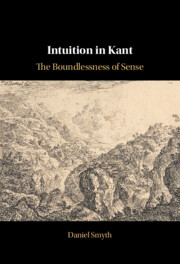Book contents
- Intuition in Kant
- Intuition in Kant
- Copyright page
- Epigraph
- Contents
- Acknowledgments
- Abbreviations, Citations, and Other Conventions
- Introduction
- 1 Reason’s Self-Knowledge and Kant’s Critical Methodology
- 2 Synthetic Judgment and Intuition
- 3 An Apperceptive Approach to the Transcendental Aesthetic
- 4 Exposition, Conceptual Analysis, and Apperception
- 5 Infinity, Discursivity, Givenness
- 6 Prolegomena to a Stufenleiter of Kantian Intuition
- 7 A Stufenleiter of Kantian Intuition, Part I
- 8 A Stufenleiter of Kantian Intuition, Part II
- Bibliography
- Index
1 - Reason’s Self-Knowledge and Kant’s Critical Methodology
Published online by Cambridge University Press: 07 March 2024
- Intuition in Kant
- Intuition in Kant
- Copyright page
- Epigraph
- Contents
- Acknowledgments
- Abbreviations, Citations, and Other Conventions
- Introduction
- 1 Reason’s Self-Knowledge and Kant’s Critical Methodology
- 2 Synthetic Judgment and Intuition
- 3 An Apperceptive Approach to the Transcendental Aesthetic
- 4 Exposition, Conceptual Analysis, and Apperception
- 5 Infinity, Discursivity, Givenness
- 6 Prolegomena to a Stufenleiter of Kantian Intuition
- 7 A Stufenleiter of Kantian Intuition, Part I
- 8 A Stufenleiter of Kantian Intuition, Part II
- Bibliography
- Index
Summary
Kant repeatedly claims his critical enterprise is analogous to pure general logic (PGL) in embodying the self-knowledge of reason. I argue that PGL is self-knowledge in the sense that its claims are epistemically grounded in pure apperception, which yields insight into the form of thinking in general. Kant’s critical epistemology, as distinct from his critical metaphysics, is self-knowledge in an analogous sense: It is an apperceptively grounded inquiry into the form of all a priori thought about objects. I develop an account of the purity, generality, and formality of PGL, which I then leverage into an outline of the apperceptive method that underwrites Kant’s faculty psychology. This novel account of Kant’s critical method distinguishes it from the analytical but dogmatic method of Wolff and the reflective but empirical methods of Locke and Tetens.
Keywords
- Type
- Chapter
- Information
- Intuition in KantThe Boundlessness of Sense, pp. 14 - 43Publisher: Cambridge University PressPrint publication year: 2024

